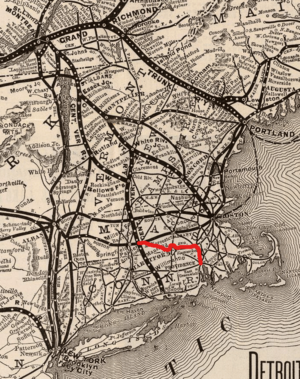Southern New England Railway
The Southern New England Railway was a never-finished plan by the Grand Trunk Railway (GT) to build a railroad from the GT-owned Central Vermont Railway at Palmer, Massachusetts east and south to the all-weather port of Providence, Rhode Island. Despite never being finished, large amounts of grading and construction were done, including many large concrete supports.
The railroad was chartered in April 1910, and was to be built as a completely grade-separated air line, having low grades and long high bridges over valleys. Construction was begun, but the man in charge (Charles Melville Hays) sunk with the RMS Titanic in 1912. Construction stopped in Rhode Island, but continued for a while in Massachusetts so the contractor could get paid for the work. Thus almost all the grading in Massachusetts was completed, and many supports are still in place.

In Millville, Massachusetts, the SNE would have passed over the Blackstone River on a high-level bridge, with both the New York and New England Railroad (now abandoned) and the Providence and Worcester Railroad (still in use) below. Several full-height supports were built, as well as several partial supports in the river.
The main route would have gone through Woonsocket, Rhode Island to downtown Providence, with a branch around the west side to the docks south of downtown.
Some of the plans included a branch to Boston or a separate route to Boston from the Central Vermont, but this never got to the construction stage.
| Wikimedia Commons has media related to: Southern New England Railway |
References
- Railroad History Database
- Larry Lowenthal, Titanic Railroad: The Southern New England, Branch Line Press, ISBN 0-9662736-0-5


